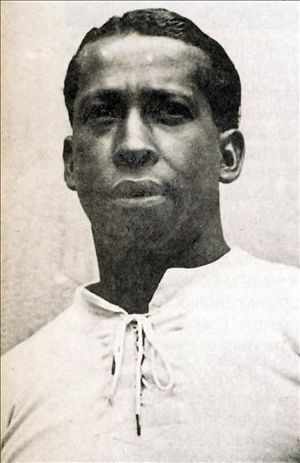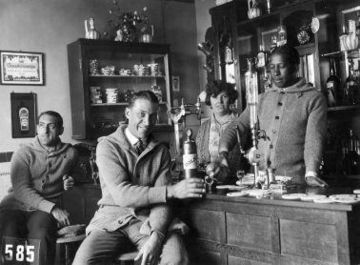José Leandro Andrade facts for kids

José Andrade in 1926
|
|||||||||||||||||||||||||||||||||||||||||||
| Personal information | |||||||||||||||||||||||||||||||||||||||||||
|---|---|---|---|---|---|---|---|---|---|---|---|---|---|---|---|---|---|---|---|---|---|---|---|---|---|---|---|---|---|---|---|---|---|---|---|---|---|---|---|---|---|---|---|
| Full name | José Leandro Andrade | ||||||||||||||||||||||||||||||||||||||||||
| Date of birth | 22 November 1901 | ||||||||||||||||||||||||||||||||||||||||||
| Place of birth | Salto, Uruguay | ||||||||||||||||||||||||||||||||||||||||||
| Date of death | 5 October 1957 (aged 55) | ||||||||||||||||||||||||||||||||||||||||||
| Place of death | Montevideo, Uruguay | ||||||||||||||||||||||||||||||||||||||||||
| Height | 1.80 m (5 ft 11 in) | ||||||||||||||||||||||||||||||||||||||||||
| Position(s) | Defensive midfielder | ||||||||||||||||||||||||||||||||||||||||||
| Youth career | |||||||||||||||||||||||||||||||||||||||||||
| Misiones | |||||||||||||||||||||||||||||||||||||||||||
| Senior career* | |||||||||||||||||||||||||||||||||||||||||||
| Years | Team | Apps | (Gls) | ||||||||||||||||||||||||||||||||||||||||
| 1921–1923 | Bella Vista | 71 | (7) | ||||||||||||||||||||||||||||||||||||||||
| 1924–1930 | Nacional | 105 | (29) | ||||||||||||||||||||||||||||||||||||||||
| 1931–1935 | Peñarol | 88 | (3) | ||||||||||||||||||||||||||||||||||||||||
| 1933 | Atlanta | 1 | (0) | ||||||||||||||||||||||||||||||||||||||||
| 1934 | Lanús-Talleres | 2 | (0) | ||||||||||||||||||||||||||||||||||||||||
| Wanderers | 17 | (0) | |||||||||||||||||||||||||||||||||||||||||
| Total | 284 | (39) | |||||||||||||||||||||||||||||||||||||||||
| International career | |||||||||||||||||||||||||||||||||||||||||||
| 1923–1930 | Uruguay | 34 | (1) | ||||||||||||||||||||||||||||||||||||||||
|
Medal record
|
|||||||||||||||||||||||||||||||||||||||||||
| *Club domestic league appearances and goals | |||||||||||||||||||||||||||||||||||||||||||
José Leandro Andrade (1901–1957) was a famous Uruguayan footballer. He played as a wing-half, which is like a defensive midfielder. People called him "The Black Marvel" (maravilla negra).
During his best years, he was seen as one of the top footballers in the world. He helped the Uruguay national football team become very strong in the 1920s. He won two Olympic Gold Medals and the first ever FIFA World Cup.
Contents
Early Life of José Leandro Andrade
Andrade was born in Salto, Uruguay, in 1901. His mother was from Argentina. José Ignacio Andrade, who was 98 years old, was listed as a witness on his birth certificate. He is believed to have been José Leandro's father.
When he was young, Andrade moved to the Palermo area in Montevideo. He lived there with his aunt.
Before football became a professional sport in Uruguay, Andrade worked many different jobs. He was a musician in a carnival, playing drums, violin, and tambourine. He also led a drum group for a carnival parade called Libertadores de Africa. At other times, he worked as a shoeshiner and sold newspapers.
Playing Career of José Leandro Andrade
Andrade was a very talented player who achieved great success in both club and international football.
Club Football
As a teenager, Andrade played for a club in Montevideo called Misiones.
In the early 1920s, he joined Bella Vista. He played 71 matches for them and scored seven goals. While at Bella Vista, he was chosen to play for the national team for the first time.
Andrade later moved to Nacional. There, he won four Uruguayan Championships and three national cups.
In 1930, Andrade transferred to Peñarol. He played 88 matches for them over the next few years. It's interesting that he had trained with Peñarol as a teenager but wasn't accepted into the team back then.
In the mid-1930s, he played for several teams in Argentina. These included Atlanta and Lanús-Talleres. He also had a short time playing for Wanderers in Uruguay.
International Football
Andrade played 34 matches for the Uruguayan national team, known as la Celeste Olimpica. He scored one goal between 1923 and 1930.
South American Championship
Andrade was part of the teams that won the South American Championship in 1923, 1924, and 1926. This tournament is now known as the Copa América.
1924 Olympic Games
Andrade won his first Olympic gold medal at the 1924 Olympic football tournament in Paris. He was known as the first black international football player to play in the Olympics. He was nicknamed The Black Marvel and The Black Pearl. The name "The Black Pearl" was later used for the famous player Pelé.
After their 1924 Olympic win, the Uruguayan team was challenged to two matches by Argentina. In the second match in Buenos Aires, Argentine fans threw stones at Andrade and his team. The Uruguayan players threw the stones back. A riot started, and a Uruguayan player was arrested. The Uruguayans refused to finish the match.
1928 Olympic Games
In 1928, Andrade won his second Olympic gold medal at the 1928 Olympics in Amsterdam. During a semi-final match against Italy, Andrade accidentally hit a goal post. This caused a serious injury to one of his eyes. Over time, his eyesight in that eye got worse, and he eventually became blind in it.
1930 FIFA World Cup
Even though he was not at his very best due to his eye injury, Andrade was still one of Uruguay's top players. He helped them win the first ever FIFA World Cup. After the tournament, he was chosen for the All-Star team. In 1994, France Football magazine ranked him as number ten in their World Cup Top-100 list.
A special plaque was placed at the Estadio Centenario stadium to honor his great achievements.
Playing Style
Andrade was known as a smart and fair player. He never celebrated his goals in a big way. He was a very active, fast, and skilled player. He could control the game on the field without needing to be as physical as some of his teammates.
Later Life
In 1925, Andrade's Uruguayan club team, Nacional, toured nine European countries. Over 800,000 people came to watch them play.
Andrade was a guest at the 1950 FIFA World Cup. This was when Uruguay won their second world championship. His nephew, Víctor Rodríguez Andrade, was a member of the 1950 team. He had adopted Andrade's last name to honor him. In 1956, a German journalist found Andrade living in very poor conditions in Montevideo. Andrade passed away the following year at the age of 55.
Honours and Achievements
Club Honours
- Nacional
- Primera División Uruguaya
- Winner: 1924
- Runner-up: 1929
- Primera División Uruguaya
- Peñarol
- Primera División Uruguaya
- Winner: 1932, 1935
- Runner-up: 1933, 1934
- Primera División Uruguaya
International Honours
- Uruguay
- Olympic Games
- Gold medal: 1924, 1928
- FIFA World Cup
- Winner: 1930
- South American Championship
- Winner: 1923, 1924, 1926
- Runner-up: 1927
- Olympic Games
Individual Awards
- IFFHS Football Player of the Century: 69th
- South American Championship: Best Player 1926
- FIFA World Cup: Bronze Ball 1930
- FIFA World Cup: All-Star Team 1930
- France Football's World Cup Top-100 1930–1990: 10th
See also
 In Spanish: José Leandro Andrade para niños
In Spanish: José Leandro Andrade para niños
 | Selma Burke |
 | Pauline Powell Burns |
 | Frederick J. Brown |
 | Robert Blackburn |


